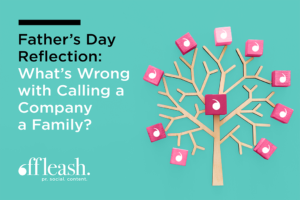Father’s Day Reflection: What’s Wrong with Calling a Company a Family?

Every few years, for reasons that are beyond me, a debate breaks out about the appropriateness of referring to one’s company as a “family.” The fuss usually begins when a prominent corporate leader declares that companies aren’t families, they’re like sports teams.
This discussion was reignited in May when Insider published an email to employees by Shopify CEO Tobias Lütke in which he called the notion of colleagues as family “preposterous.”
“It should be massively obvious that Shopify is not a family,” wrote Lütke, who appeared to be having a very bad day, “but I see people, even leaders, casually use terms like ‘Shopifam’ which will cause the members of our teams (especially junior ones that have never worked anywhere else) to get the wrong impression. The dangers of ‘family thinking’ are that it becomes incredibly hard to let poor performers go. Shopify is a team, not a family.”
His denunciation of the F-word was remarkably similar to a rant by LinkedIn co-founder Reid Hoffman published by Harvard Business Review in June 2014 (intentionally or not, two days after Father’s Day).
“When CEOs describe their company as being ‘like family,’ we think they mean well,” Hoffman and two co-authors wrote. “…But using the term family makes it easy for misunderstandings to arise. In a real family, parents can’t fire their children… In contrast to a family, a professional sports team has a specific mission (to win games and championships), and its members come together to accomplish that mission.”
With all due respect to Lütke, Hoffman, and anyone else who has made this argument through the years — Google “companies are like sports teams not families” and you’ll see many other examples – I’ll go on thinking of my employer as a family, thanks.
Not on the same level as my actual family, obviously. My actual family is my wife and grown son and daughter. (And, by the way, an early Happy Father’s Day to me as well as the other dads at our agency, Scott and Rich.) But I do think of the people I work with as a unique, extended family.
“Family” seems not only not-wrong to me, but sensible (at least when it comes to companies where the spirit is genuine and not just a BS phrase that gets thrown around).
At a time when nearly everyone is yearning for and appreciating human connection more than ever, what could possibly be wrong with family-izing workmates you spend dozens of hours every week with – sometimes more waking hours than your actual family?
How am I supposed to feel about folks with whom I’ve shared a mission – driving forward a company we love — during nearly seven years of PR blood, sweat, tears, and laughs?
What does it mean when a co-worker’s quirks get under my skin, or vice versa, and we end up shrugging it off the way one does about an idiosyncratic cousin, because, at the end of the day, we cherish each other and our family?
How should I feel about a company that, after my dear father-in-law died recently, showed me caring and understanding that sure felt more like it was coming from a family than a football team?
The case against “family” is silly semantics.
As Soyoung Kang, CMO of skin care products company eos, said in one of nearly 300 comments on a LinkedIn post about Lütke’s email:
“For me, a high-functioning work culture is less about nomenclature, and more about its values. Yes, great performance will always be highly valued. But is inclusion a priority? Are employees treated with dignity and compassion? Do people feel they’re getting more than a paycheck out of the experience? Call it a family, or call it a team… either way these elements are increasingly in demand in the modern workplace.”
Amen.
If you caught the cold open of the season-ending “Saturday Night Live” episode on May 22, you saw Kate McKinnon, her voice breaking with emotion, say, “This was the year we realized we’re more than just a cast, we’re a family.”
Like McKinnon, those who like to think of their colleagues as family are simply being human and loving. Can you relate?
Steve Eisenstadt is Content Chief at Offleash.